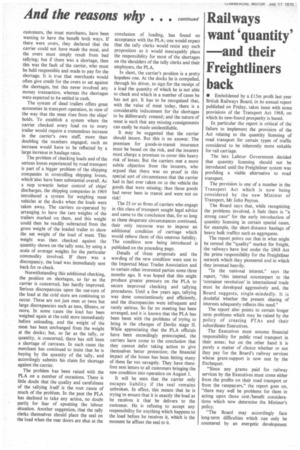Railways want 'quantity' and their Freightliners back
Page 24

Page 25

If you've noticed an error in this article please click here to report it so we can fix it.
• Emboldened by a i15rn profit last year British Railways Board, in its annual report published on Friday, takes issue with some provisions of the Transport Act 1968, on which its new-found prosperity is based.
In particular the report is critical of the failure to implement the provision of the Act relating to the quantity licensing of road transport for certain types of traffic considered to be inherently more suitable for rail carriage.
The late Labour Government decided that quantity licensing should not be introduced until the Freightliner system was providing a viable alternative to road transport.
The provision is one of a number in the Transport Act which is now being considered by the new Minister of Transport, Mr John Peyton, The Board says that, while recognizing the problems involved, it feels there is "a strong case" for the early introduction of quantity licensing in certain special cases, for example, the short-distance haulage of heavy bulk traffics such as aggregates.
The report points out that in what might be termed the "quality" market for freight, the railways have lost under the 1968 Act the prime responsibility for the Freightliner network which they pioneered and in which they invested heavily.
"In the national interest," says the report, "this internal counterpart to the 'container revolution' in international trade must be developed aggressively and, the Board suggests, single-mindedly. It is doubtful whether the present sharing of interests adequately reflects this need."
The report also points to certain longer term problems which may be raised by the policy of creating PTAs and their subordinate Executives.
The Executives must assume financial responsibility for public road transport in their areas; but on the other hand it is purely a matter of choice whether or not they pay for the Board's railway services whose grant-support is now met by the Exchequer.
"Since any grants paid for railway services by the Executives must come either from the profits on their road transport or from the ratepayers," the report goes on, "there may well be problems for them in acting upon those cost /benefit considerations which now determine the Minister's policy.
"The Board may accordingly face long-term difficulties which can only be countered by an energetic development plicy, and by improving the quality of the ;rvices provided with grant-support, so far s investment resources will permit."
The report refers to the complicated ;lationship between British Railways and ie National Freight Corporation created nder the 1968 Act.
An obvious problem exists in the case of 'reightliners Ltd. The railways' fast trunk aul, says the report, is the essence of the ervice, the road collection and delivery lements being ancillary. But the present rasis of ownership of the business reverses what would normally be the cornnercial relationship between the two rartners".
Another anomaly is claimed to exist in he need for the railways to hire road Thicles from the NFC for rail wagonload raffle requiring cartage to destination. This, he report asserts, introduces a complication nto what was formerly a straightforward ;xercise with common ownership of all ypes of vehicles required to carry out the iob.
The Board is hopeful that its 'heartening" financial performance will 'eliminate the stigma which attaches :whether justifiably or not) to recurring losses by a public corporation" and create a better impression of British Rail in the public mind.
But the surplus notwithstanding, the report warns of higher fares because of increased costs, particularly wages, and the high level of capital investment needed to improve services.
Passenger revenue increased by more than £21m which was brought up to £61m by the Exchequer contribution for socially essential services.
Freight revenues, after declining in the five years up to 1967, showed, as in 1968. "modest increases" with receipts of about £60m.
The overall picture was of a working surplus of £56m which was reduced to £15m after meeting interest charges.
The most important trends affecting the Board's future prospects are the national growth in incomes and consumer spending power; the increase in leisure: and the force of competition from other forms of transport, which has already spread to practically all the traffics now carried by rail.
Says the report: railway strategy must now be strongly concentrated upon quality of service, and the aim will be to show steady improvement year by year.
The key question is how to earn adequate working „surpluses to keep business healthy and competitive and to proteCT existing traffic from erosion by competitors. Factors affecting decisions, says the Board, must include the continuous expansion of motorways and the increasing carrying capacity of road vehicles.
On the proposed Channel Tunnel the report says that the railways will be the largest individual customers, but the new route will not, of course. be solely for rail.
(British Railways Board annual report and accounts. HMSO 15s). (See also "Janus" on page 56.)








































































































